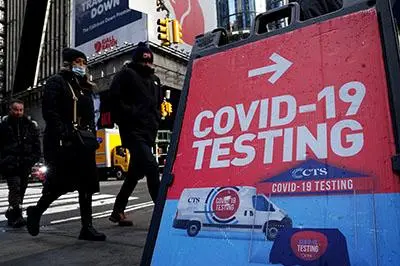PHOTO
In a press conference last week, US President Joe Biden defended his administration’s response to the COVID-19 pandemic during his first year in office. His administration had early success in combating the pandemic, but the delta and now omicron variants badly undermined that initial progress. US infection rates recently hit a record peak and now the White House is facing calls to reorient its strategy.
Reports of new cases are starting to decline, but the omicron wave has deepened a sense of exhaustion and uncertainty among Americans. Omicron’s ability to break through the immune protection provided by vaccines is particularly frustrating.
The Biden administration relied heavily on vaccination throughout most of the past year. Reports suggest that Biden’s pandemic response team had considered efforts to improve testing early in his term, but they paid much less attention to tests after it became clear that the vaccines were highly effective. While vaccines are crucial to ending the pandemic, scientists warned that a new variant capable of evading vaccines could emerge. Vaccines continue to provide good protection against severe illness, but omicron has reduced their effectiveness against transmission.
Biden’s response to omicron could only be as strong as the foundation built through previous efforts. When he took office, the Trump administration’s legacy included a highly successful project to develop vaccines, but it also left challenges, particularly the politicization of issues such as wearing masks. The Biden administration quickly moved to distribute vaccines, with much early success; most adults who wanted a vaccine were fully vaccinated by mid-summer. By now, most children aged five years and older have received shots if their parents chose to vaccinate. In his recent press conference, Biden noted that “we went from 2 million people being vaccinated at the moment I was sworn in to 210 million Americans being fully vaccinated today.”
While vaccinating Americans was the administration’s primary focus, the White House took additional actions to combat the pandemic. The government took some steps to increase test availability and affordability, starting with an executive order on Biden’s first full day in office. The American Rescue Plan included funding for some anti-pandemic measures. Washington has provided nearly 400 million vaccines to other countries, with plans for many more.
Multiple challenges arose, however. The Biden team underestimated the extent of vaccine hesitancy in the country. The president imposed several vaccine mandates, but the Supreme Court blocked his most sweeping mandate affecting large private-sector companies. The federal government’s limited power to impose rules about masks and other measures was evident, as many states chose different paths. Meanwhile, a lack of demand over the summer and supply chain snarls resulted in a low supply of at-home tests.
This was the foundation on which the Biden administration could build to respond to omicron. The government continued its emphasis on vaccination, leaning hard into encouraging Americans to get vaccinated and also opening up booster shots to all Americans aged 12 and older. Even as omicron’s ability to circumvent vaccine defenses became clear, the administration emphasized that the vaccines still protect against severe disease in most people.
Unfortunately, the delta and omicron waves, plus growing testing requirements, drove a spike in demand for at-home tests, which the government and private sector were unprepared for. Many Americans were unable to find tests, and tests were also fairly expensive — often about $20-$35 for a box of two tests.
Between late November and late December, the White House implemented new measures. These included mobilizing federal and military medical staff to support overburdened hospitals, expanding vaccination and, in January, announcing plans to provide 400 million non-medical N95 masks without charge.
The president admitted that his administration should have done more to address testing earlier. The White House took several steps to expand testing availability, including setting up several federal testing sites and working to increase production of tests. Last week, a new website allowed Americans to request a limited number of tests to be mailed to them. The administration has also required health insurance companies to reimburse people who buy at-home tests.
The administration deserves credit for the distribution of vaccines. However, the overreliance on vaccines has been a major weakness in responding to omicron. The White House should have used more resources earlier to ensure a minimum supply of at-home tests and to improve affordability; seeking reimbursement from private insurance companies can be a frustrating task. Furthermore, many Americans have complained about muddled messaging on masks and other important measures.
It is too early to determine which countries best managed omicron. As the pandemic evolves, comparing countries becomes increasingly difficult, given varying policies and experiences with the virus so far. Much depends on a country’s level of immunity through vaccination or previous exposure. Some countries have imposed new lockdowns — something Biden has said that he will not do. Many countries, including the US, have reduced quarantine periods. Israel is experimenting with a fourth booster shot for more vulnerable people. Masking policies vary widely between countries.
Despite challenges in making comparisons, Europe had one major advantage in the foundation that it built before omicron hit: Affordable and available testing. While there is no silver bullet that would have prevented omicron, the US could have fared better with more readily available tests to help Americans determine their personal risks. Biden’s response on testing came very late — probably too late to really address omicron — but it could help build a better foundation for responding to any future variants.
- Kerry Boyd Anderson is a writer and political risk consultant with more than 18 years of experience as a professional analyst of international security issues and Middle East political and business risk. Her previous positions include deputy director for advisory with Oxford Analytica. Twitter: @KBAresearch
Copyright: Arab News © 2022 All rights reserved. Provided by SyndiGate Media Inc. (Syndigate.info).





















